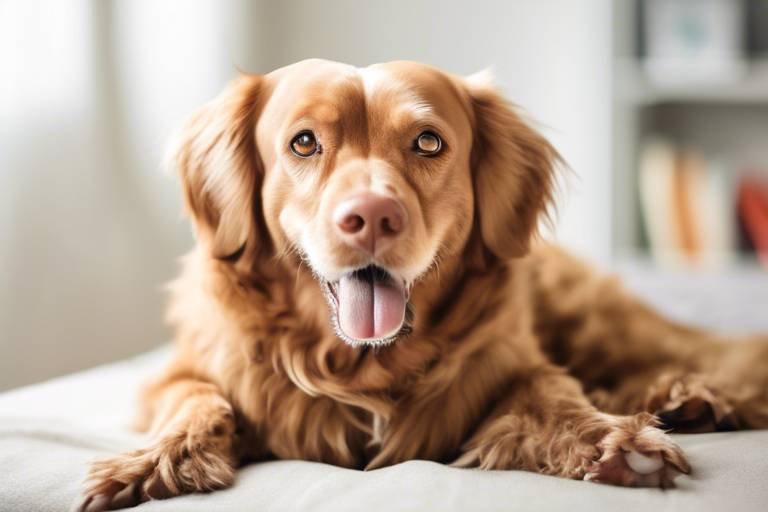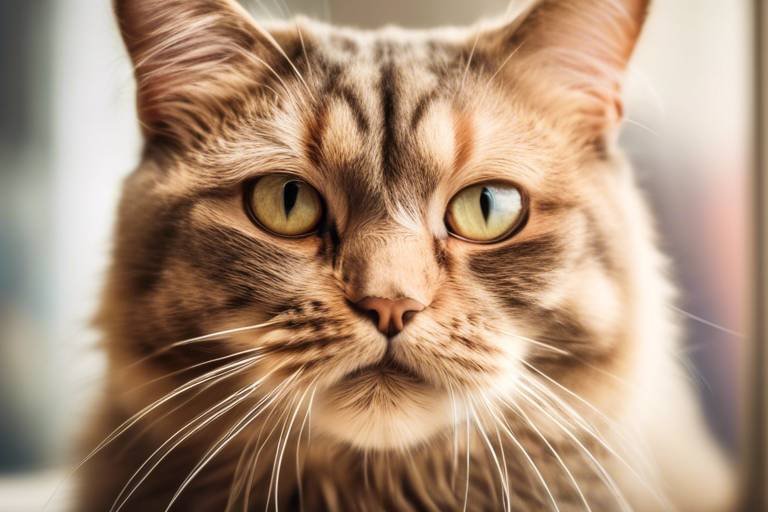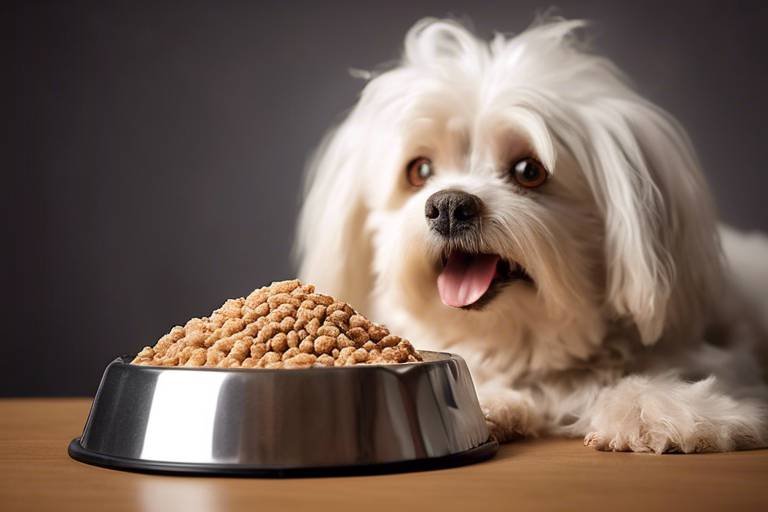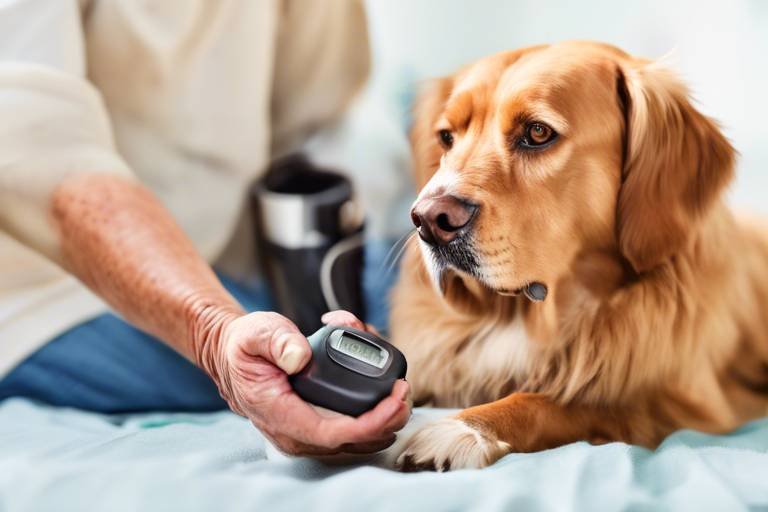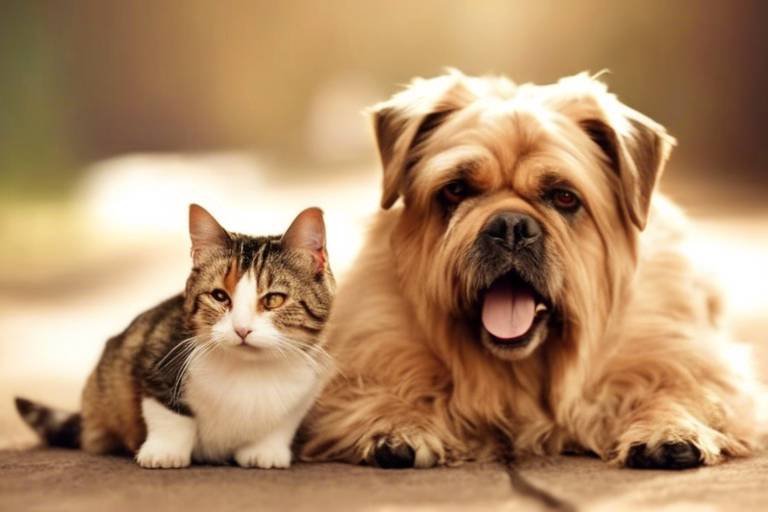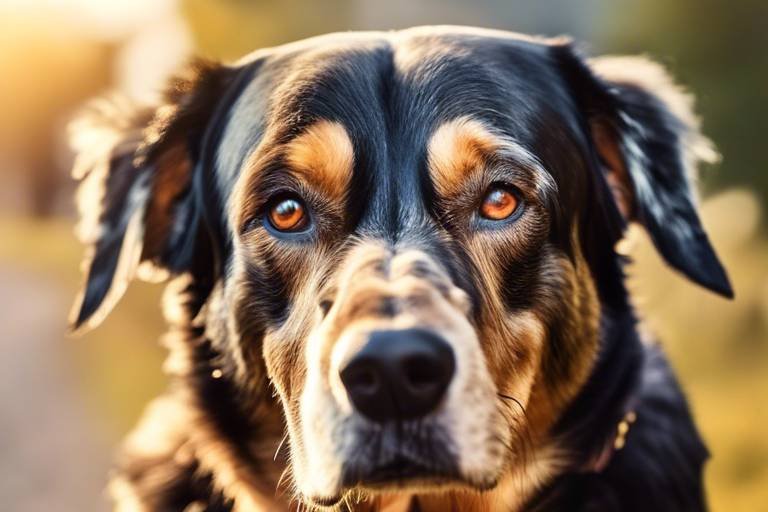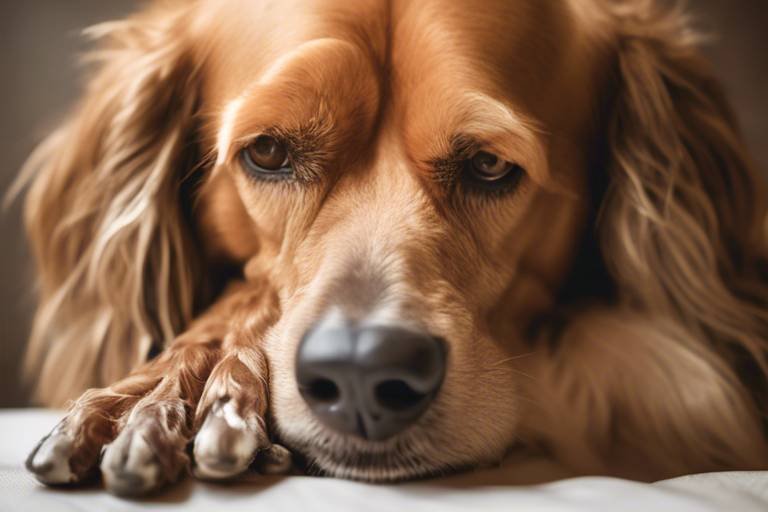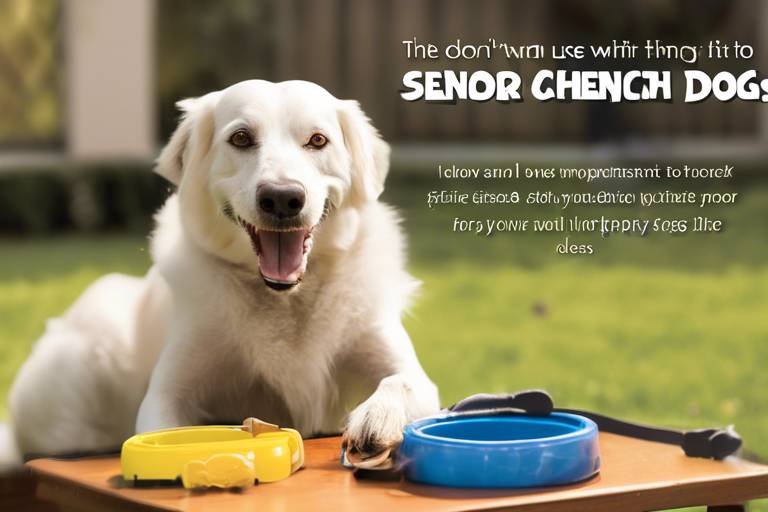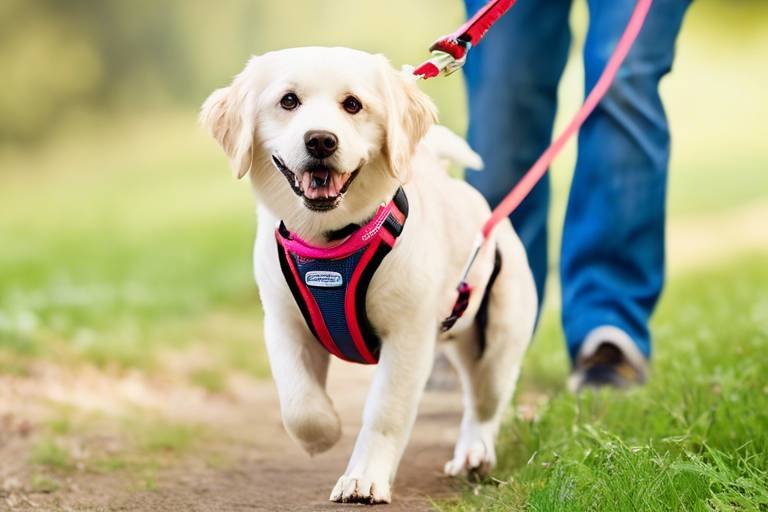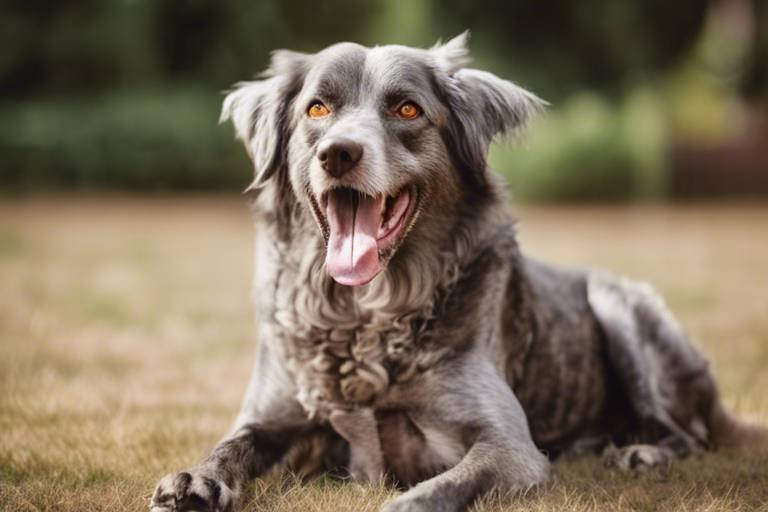Tips for Adjusting Your Senior Pet's Diet
As our furry companions age, we often find ourselves reflecting on the joy and love they bring into our lives. However, just like us, senior pets require special attention, particularly when it comes to their diet. Adjusting your senior pet’s diet is not just about changing their food; it’s about ensuring they receive the right balance of nutrients to maintain their health and vitality. So, how do you navigate this important aspect of pet care? Let’s dive into some essential tips that will help you tailor your senior pet's diet for their golden years.
As pets age, their nutritional requirements change significantly. Senior pets often need fewer calories but more of certain nutrients to support their health. For instance, they may require more fiber to aid digestion and prevent obesity, while also needing increased levels of certain vitamins and minerals to support their immune system. It's crucial to recognize that every pet is unique, so understanding their specific needs is key to crafting the perfect diet. Think of it like adjusting the gears on a bicycle; you want to ensure everything is in sync for a smooth ride.
How do you know when it’s time to adjust your senior pet's diet? There are several common indicators that suggest dietary changes may be necessary. For example, have you noticed your pet becoming less active or gaining weight? Perhaps they seem to be having difficulty with their usual food, or maybe their coat isn’t as shiny as it used to be. These signs can be your pet’s way of communicating that their diet needs a little tweak. Paying close attention to their behavior and physical condition can make all the difference in their health.
Maintaining a healthy weight is vital for senior pets. Obesity can lead to a myriad of health issues, including diabetes and joint problems. Therefore, monitoring your pet's weight regularly is essential. You can do this by weighing them at home or during vet visits. If you notice your pet is gaining weight, it might be time to adjust their diet. On the flip side, if they are losing weight unexpectedly, that can also be a concern. Remember, keeping your pet at a healthy weight is like keeping a car in good condition; it requires regular check-ups and adjustments.
Proper portion sizes are essential for weight management. But how do you determine the right amount? Start by checking the feeding guidelines on your pet’s food packaging, but don’t forget to consider your pet’s age, weight, and activity level. It might be helpful to use measuring cups or a kitchen scale to ensure accuracy. Think of it as cooking a recipe; the right measurements can make all the difference!
The quality of food ingredients plays a significant role in senior pet health. Look for high-quality, nutrient-dense foods that are specifically formulated for senior pets. Ingredients like real meat, wholesome grains, and fresh vegetables can provide the essential nutrients your pet needs. A good rule of thumb is to avoid foods with artificial preservatives and fillers. Just like we prefer fresh ingredients in our meals, your pets deserve the same!
Hydration is another critical aspect of your senior pet's diet. Older pets may not drink as much water as they should, leading to dehydration. To keep your pet hydrated, always have fresh water available, and consider adding wet food to their diet, which can help increase their fluid intake. Watch for signs of dehydration, such as dry gums or lethargy; these can be serious indicators that your pet needs more fluids. Think of water as the oil in a well-running engine; without it, things can start to break down.
Regular veterinary consultations are essential when adjusting your senior pet's diet. Your vet can provide invaluable insights tailored to your pet’s specific health needs. They can help you identify the right food choices and portion sizes, ensuring your furry friend stays healthy and happy. Just like we consult experts for our health, our pets deserve the same level of care.
Dietary supplements can enhance your senior pet's nutrition, providing additional support as they age. Omega-3 fatty acids, glucosamine, and probiotics are examples of supplements that may benefit aging pets. However, it’s essential to consult your veterinarian before introducing any supplements to ensure they’re safe and appropriate for your pet. Think of supplements as the cherry on top of a delicious sundae; they can enhance the overall experience but shouldn’t be the main focus.
Some pet owners consider homemade diets for their senior pets. While homemade meals can be nutritious, it’s crucial to ensure they are balanced and meet all of your pet's dietary needs. Consulting with a veterinarian or a pet nutritionist can help you create a well-rounded meal plan. Homemade diets can be like crafting a custom suit; they can be tailored to fit perfectly, but they require careful planning to ensure they’re just right.
- What are the signs that my senior pet needs a diet change? Look for weight changes, decreased energy, and changes in coat quality.
- How often should I consult my veterinarian about my pet's diet? Regular check-ups, at least once a year, or more frequently if you notice changes in your pet's health.
- Can I feed my senior pet homemade food? Yes, but ensure it is balanced and consult with a veterinarian to avoid nutritional deficiencies.
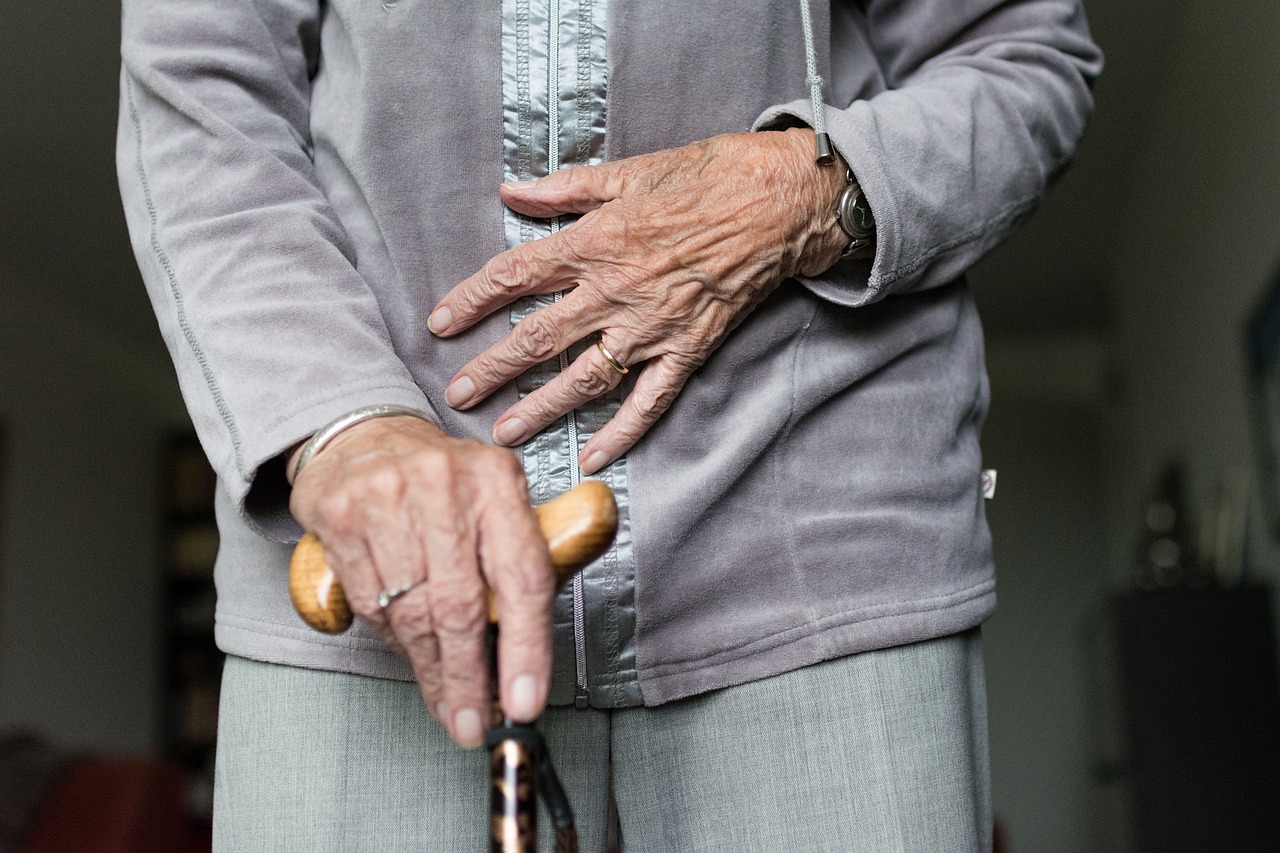
Understanding Nutritional Needs
As our furry companions age, their bodies undergo a myriad of changes that significantly impact their nutritional needs. Just like humans, senior pets require a tailored diet to support their health and well-being. It's essential to recognize that the food they enjoyed in their younger years may not suffice as they grow older. So, what exactly do senior pets need?
First and foremost, senior pets often require higher levels of certain nutrients to maintain their vitality. For instance, protein becomes crucial as it helps in preserving muscle mass, which can diminish with age. Alongside protein, fiber plays a pivotal role in promoting healthy digestion, which can slow down as your pet ages. Additionally, senior pets may benefit from omega fatty acids, which support joint health and can alleviate arthritis symptoms, a common ailment in older animals.
Moreover, it’s vital to consider antioxidants in their diet. These powerful compounds help combat oxidative stress, which can lead to chronic diseases. Foods rich in vitamins C and E, as well as beta-carotene, can be particularly beneficial. But how do you know if your pet is getting these essential nutrients?
To better understand your senior pet's dietary needs, it’s beneficial to consult with your veterinarian. They can provide insights specific to your pet's health conditions, activity level, and any weight concerns. It's like having a personal trainer for your pet's diet! Your vet might recommend a specialized senior pet food that meets these nutritional requirements. Here’s a quick breakdown of key nutrients to consider:
| Nutrient | Importance | Sources |
|---|---|---|
| Protein | Supports muscle maintenance | Chicken, fish, eggs |
| Fiber | Aids in digestion | Sweet potatoes, pumpkin, brown rice |
| Omega Fatty Acids | Supports joint health | Fish oil, flaxseed oil |
| Antioxidants | Fights oxidative stress | Fruits, vegetables, nuts |
In conclusion, understanding your senior pet's nutritional needs is an ongoing process that requires attention and adaptation. By incorporating the right balance of nutrients and being mindful of their changing health, you can ensure your furry friend continues to thrive in their golden years. Remember, a well-fed pet is a happy pet!

Identifying Dietary Changes
As our beloved furry companions age, their bodies undergo significant transformations, leading to changing dietary needs. Recognizing when your senior pet requires dietary adjustments is crucial for maintaining their health and well-being. But how do you know when it’s time to make a change? It’s not always obvious, but there are several signs to look out for. For instance, if you notice a shift in your pet's energy levels, appetite, or even their bathroom habits, it may be a signal that their diet needs a revamp.
One of the most telling indicators is weight fluctuation. If your pet is gaining weight, it could be a sign that their current diet is too rich or that they’re not getting enough exercise. Conversely, if they are losing weight unexpectedly, it might indicate that they’re not getting the right nutrients or that they have underlying health issues. Monitoring your pet’s weight regularly can provide insights into their dietary needs. You might be surprised to learn that even slight changes in weight can have a big impact on their overall health!
Another factor to consider is your pet's dental health. Older pets often experience dental issues that can affect their ability to chew. If you notice your pet is suddenly reluctant to eat, or if they seem to be favoring softer foods, it might be time to evaluate their diet. An increase in dental problems can necessitate a shift to softer, easier-to-chew foods that still offer the nutrients they need.
Behavioral changes can also be a key indicator. Is your pet more lethargic than usual? Are they showing signs of discomfort after meals? These changes can signal that their current food isn’t meeting their nutritional requirements. For senior pets, it’s essential to provide meals that are not only palatable but also easy to digest. Ingredients that are high in fiber can aid digestion and help prevent gastrointestinal issues, which are common in older pets.
Furthermore, keep an eye out for any changes in your pet's coat or skin. A dull coat, excessive shedding, or dry skin can suggest that your pet is lacking essential fatty acids or other nutrients. A diet rich in omega-3 and omega-6 fatty acids can help improve coat health and overall vitality. If you notice any of these signs, it’s a good idea to consult with your veterinarian about possible dietary changes.
To summarize, here are some common signs that may indicate it's time to adjust your senior pet's diet:
- Weight gain or loss
- Changes in appetite or eating habits
- Dental issues affecting chewing
- Behavioral changes, such as lethargy
- Changes in coat or skin condition
By staying observant and proactive, you can ensure that your senior pet receives the proper nutrition they need as they age. Remember, each pet is unique, and what works for one may not work for another. Tailoring their diet to their specific needs will help keep them happy, healthy, and full of life!
Q: How often should I evaluate my senior pet's diet?
A: It's a good idea to evaluate your senior pet's diet at least every six months or whenever you notice any significant changes in their weight, behavior, or health.
Q: Can I switch to a senior-specific pet food?
A: Absolutely! Senior-specific pet foods are formulated to meet the unique nutritional needs of older pets. Consult your vet for recommendations tailored to your pet's health status.
Q: What should I do if my senior pet is a picky eater?
A: If your senior pet is picky, try offering a variety of high-quality, palatable foods. You can also warm their food slightly or mix in some wet food to entice them.
Q: Are homemade diets suitable for senior pets?
A: Homemade diets can be suitable, but they must be well-balanced and meet all nutritional requirements. It's best to consult with a veterinarian or a pet nutritionist before making the switch.
Weight Management
Maintaining a healthy weight is not just a matter of aesthetics for senior pets; it’s a crucial aspect of their overall health and well-being. As our furry friends age, their metabolism tends to slow down, and they may become less active. This means that the same amount of food they used to eat could now lead to unwanted weight gain. But how do you know if your pet is at a healthy weight? Regularly monitoring their weight is essential. You can do this by weighing them at home or during visits to the vet. A good rule of thumb is to check their body condition score (BCS), which evaluates their body fat and muscle mass. A score of 4 to 5 out of 9 is considered ideal for most pets.
So, what should you do if you notice your senior pet is tipping the scales? First, it’s important to adjust their diet. This doesn’t mean you have to starve them; instead, focus on quality over quantity. Consider switching to a weight management formula that is lower in calories but still packed with essential nutrients. These formulas often contain higher fiber content, which can help your pet feel full without consuming excess calories. You might also want to incorporate more lean proteins and fewer carbohydrates into their meals, as this can help maintain muscle mass while shedding those extra pounds.
When it comes to portion control, it’s not just about how much food you give them, but also about understanding their specific needs. Each pet is unique, and factors like breed, size, and activity level play a significant role in determining their ideal portion sizes. For example, a sedentary senior dog may need 20% fewer calories than a younger, active dog of the same breed. To simplify this, consider using a pet food measuring cup or a digital scale to ensure you're serving the right amount. Additionally, consult with your veterinarian to create a tailored feeding plan that meets your pet's individual requirements.
Another important aspect of weight management is incorporating regular exercise into your pet's routine. While your senior pet may not be able to run like they used to, gentle activities like short walks, swimming, or even playtime can help keep them active. Aim for at least 20-30 minutes of moderate activity each day, but always consult with your veterinarian before starting any new exercise regimen.
In summary, weight management for senior pets is a multifaceted approach that includes monitoring their weight, adjusting their diet, controlling portions, and ensuring they get enough exercise. By being proactive and attentive to their needs, you can help your beloved pet maintain a healthy weight, leading to a happier and longer life.
- How often should I weigh my senior pet? It's recommended to weigh your senior pet at least once a month to monitor any significant changes.
- Can I give my senior pet treats? Yes, but be mindful of the calories in treats and consider them part of their daily caloric intake.
- What are some signs my pet is overweight? Look for difficulty in breathing, reluctance to exercise, and visible fat deposits around the ribs and waist.
- Should I consult my vet before making dietary changes? Absolutely! A veterinarian can provide personalized advice based on your pet's health and needs.
Portion Control
When it comes to managing your senior pet's diet, is absolutely essential. Think of it like this: just as we humans need to watch our serving sizes to maintain a healthy weight, our furry friends require the same level of attention. As pets age, their metabolism slows down, which means they don’t need as many calories as they did in their younger years. This makes it crucial to evaluate how much food you’re putting in their bowl each day.
To determine the right portion size for your senior pet, consider a few factors:
- Weight: Regularly weigh your pet to track any changes. If they’re gaining weight, it might be time to cut back on portions.
- Activity Level: Is your pet still playing and running around, or are they more of a couch potato now? Less activity typically requires fewer calories.
- Health Conditions: Certain health issues, such as diabetes or kidney disease, may necessitate specific portion sizes and types of food.
But how do you actually measure out the right portions? A good starting point is to refer to the feeding guidelines on the pet food package. However, these are just general recommendations. It’s wise to consult with your veterinarian to tailor these suggestions to your pet's unique needs. They can help you create a personalized feeding plan that takes into account your pet’s weight, age, and health status.
One effective method to manage portion control is to use a measuring cup or a kitchen scale. This ensures you’re providing the exact amount of food your pet requires. Additionally, consider dividing their daily food intake into smaller meals throughout the day. This not only helps in managing their weight but also aids in digestion and keeps their energy levels stable.
In summary, keeping an eye on portion sizes is a simple yet powerful way to support your senior pet's health. Just remember, every pet is unique, and what works for one might not work for another. So, keep observing your pet's behavior and health, and adjust portions as necessary. Your furry friend will thank you for it!
Q: How often should I feed my senior pet?
A: Most senior pets do well with two meals a day, but this can vary based on their health needs. Consult your vet for personalized advice.
Q: Can I free-feed my senior pet?
A: Free-feeding can lead to overeating, especially in less active senior pets. It’s better to measure out portions and feed them at set times.
Q: What if my senior pet is a picky eater?
A: If your pet is refusing to eat, it’s important to check with your veterinarian to rule out any underlying health issues. Sometimes, mixing in a small amount of wet food can entice them to eat.
Q: Are there specific foods I should avoid for senior pets?
A: Yes, avoid foods high in fillers, artificial preservatives, and excessive fat. Always choose high-quality, nutrient-dense foods suited for senior pets.
Quality of Ingredients
When it comes to feeding your senior pet, the in their food can make all the difference. Think of it like cooking for yourself; would you rather eat a gourmet meal made with fresh, high-quality ingredients or a processed dish loaded with fillers? The same principle applies to our furry friends. Senior pets often have specific dietary needs, and choosing the right food can help ensure they receive the essential nutrients necessary for their health and vitality.
One of the first things to consider is the source of protein in your pet's diet. As pets age, they require more high-quality protein to maintain muscle mass. Look for foods that list real meat, such as chicken, beef, or fish, as the first ingredient. Avoid foods that rely on meat by-products or fillers like corn and soy, which can be harder for older pets to digest. It's like choosing between a juicy steak and a mystery meat patty—one is nourishing, while the other is just filling.
Furthermore, it's essential to pay attention to the fat content in your senior pet's diet. While healthy fats are crucial for energy and skin health, too much fat can lead to obesity, especially in less active senior pets. Look for foods that contain omega-3 and omega-6 fatty acids, which can promote a shiny coat and support joint health. A balanced fat content can be likened to a well-tuned engine; it keeps everything running smoothly without overheating.
In addition to proteins and fats, fiber is another critical component of a senior pet's diet. Fiber aids in digestion and can help prevent constipation, a common issue in older pets. Foods that contain whole grains or vegetables like sweet potatoes and peas can provide the necessary fiber while also delivering other vital nutrients. Think of fiber as the broom that sweeps through your pet's digestive system, ensuring everything stays clean and orderly.
Lastly, don’t overlook the importance of added vitamins and minerals. Senior pets often benefit from additional nutrients that support their aging bodies. Look for foods fortified with antioxidants, glucosamine, and chondroitin, which can help maintain joint health and combat oxidative stress. Choosing a food rich in these beneficial ingredients is like giving your pet a daily multivitamin, ensuring they have what they need to thrive.
In summary, the quality of ingredients in your senior pet's diet is paramount. Opt for foods that prioritize real, wholesome ingredients over fillers and by-products. By doing so, you're not just feeding your pet; you're investing in their health and happiness during their golden years. Remember, a little extra attention to what goes into their bowl can lead to a world of difference in their overall well-being.
- What should I look for in a senior pet food? Look for high-quality protein sources, healthy fats, adequate fiber, and added vitamins and minerals.
- Can I feed my senior pet homemade food? Yes, but ensure it is balanced and includes all necessary nutrients. Consulting with a veterinarian is advisable.
- How can I tell if my pet is getting enough nutrition? Monitor their weight, energy levels, and overall health. Regular vet check-ups can also help assess their nutritional needs.
- Are there specific ingredients to avoid in senior pet food? Yes, avoid foods with fillers like corn and soy, and those that list meat by-products as the main protein source.
Hydration Needs
When it comes to the health of our senior pets, hydration is often an overlooked yet crucial aspect. Just like humans, as pets age, their ability to conserve water diminishes, making it essential to ensure they are drinking enough fluids. You might wonder, "How can I tell if my pet is hydrated?" Well, there are several signs to look out for, such as dry gums, lethargy, and a decrease in skin elasticity. A simple test is to gently pinch the skin on the back of their neck; if it doesn’t bounce back quickly, your furry friend might need more water.
Incorporating hydration into your senior pet's diet can be as simple as ensuring fresh water is always available. But did you know that certain foods can also help with hydration? Foods with high moisture content, like wet or canned food, can be a great addition to their meals. Not only do they provide essential nutrients, but they also contribute to your pet’s overall water intake. If your pet is reluctant to drink water, you might consider adding a splash of low-sodium broth or even ice cubes to their bowl to entice them.
For those who want to take a proactive approach, consider setting a hydration schedule. Just like we might remind ourselves to drink water throughout the day, establishing a routine for your pet can encourage them to drink more. Here’s a quick table to help you track their water intake:
| Date | Amount of Water Consumed (oz) | Notes |
|---|---|---|
| Day 1 | 10 | Normal |
| Day 2 | 8 | Less active |
| Day 3 | 12 | Increased activity |
Monitoring your senior pet’s hydration levels is not just about preventing dehydration; it’s also about enhancing their quality of life. Remember, a well-hydrated pet is often a more active and happier pet! If you notice any drastic changes in their drinking habits, don’t hesitate to consult your veterinarian. They can provide tailored advice and check for any underlying health issues that may be affecting your pet's hydration.
Q: How much water should my senior pet drink daily?
A: On average, pets should drink about 1 ounce of water per pound of body weight. However, this can vary based on their diet, activity level, and health condition.
Q: What are the signs of dehydration in pets?
A: Common signs include dry gums, sunken eyes, lethargy, and loss of skin elasticity. If you notice these symptoms, it’s crucial to get your pet hydrated and consult a veterinarian.
Q: Can I give my pet flavored water?
A: Yes, but ensure that it’s low in sodium and free from any harmful additives. Broth can be a tasty way to encourage hydration!
Q: Should I switch to wet food for my senior pet?
A: Wet food can be beneficial as it contains higher moisture levels. However, consult your vet before making any significant changes to their diet.

Consulting with a Veterinarian
When it comes to adjusting your senior pet's diet, consulting with a veterinarian is not just a good idea; it's an absolute necessity. Think of your vet as the captain of your pet's health ship, steering you through the sometimes turbulent waters of dietary changes. As pets age, their bodies undergo numerous changes that can affect their nutritional needs. A veterinarian can help identify these specific needs based on your pet's age, weight, breed, and health conditions. They can also provide tailored advice on the best food options and supplements that will keep your furry friend in tip-top shape.
During your consultation, be prepared to discuss your pet's current diet, any health issues they may have, and changes you've noticed in their behavior or physical condition. For instance, have they been less active? Do they seem to be losing weight? These observations can provide vital clues for your vet. It's also essential to ask questions about the ingredients in pet food, as not all brands are created equal. A knowledgeable vet can guide you on what to look for in high-quality pet food, ensuring that your senior pet gets the nutrients they need.
Moreover, regular veterinary check-ups become increasingly important as your pet ages. These visits allow for monitoring any potential health issues that may arise and adjusting their diet accordingly. In fact, many veterinarians recommend scheduling a check-up at least twice a year for senior pets. This way, you can stay ahead of any dietary or health issues before they become serious problems.
In addition to discussing diet, your vet may suggest dietary supplements to enhance your pet's nutrition. These supplements can provide essential vitamins and minerals that may be lacking in their regular food. However, it's crucial to consult with your veterinarian before introducing any new supplements to ensure they are safe and appropriate for your pet's unique needs.
Finally, if you're considering transitioning to a homemade diet for your senior pet, your vet can provide invaluable guidance on how to create a balanced and nutritious meal plan. They can help you understand the right proportions of proteins, carbohydrates, and fats, as well as the necessary vitamins and minerals that should be included. Homemade diets can be beneficial, but they must be carefully planned to avoid nutritional deficiencies.
- How often should I take my senior pet to the vet? It is recommended to schedule a check-up at least twice a year for senior pets.
- Can I feed my senior pet human food? Some human foods are safe for pets, but always consult your vet to ensure they are appropriate and balanced.
- What signs indicate my pet needs a dietary change? Look for changes in weight, energy levels, or digestive issues as indicators that a dietary adjustment may be necessary.
Dietary Supplements
As our beloved pets age, their bodies undergo various changes that can impact their overall health and vitality. This is where come into play! Just like humans, senior pets may benefit from additional nutrients to support their aging bodies. But what exactly do these supplements offer, and how can they help your furry friend? Let's dive into the world of pet supplements and explore their potential benefits.
First and foremost, it's essential to understand that not all supplements are created equal. When considering dietary supplements for your senior pet, look for those that are specifically formulated for their needs. Common types of supplements include:
- Omega-3 Fatty Acids: These are fantastic for promoting healthy skin and coat, as well as supporting joint health. They can help reduce inflammation and improve mobility, making them a great choice for aging pets.
- Glucosamine and Chondroitin: These supplements are well-known for their ability to support joint health and alleviate arthritis symptoms. They can be particularly beneficial for senior pets who may be experiencing stiffness or discomfort.
- Antioxidants: Supplements rich in antioxidants can help combat oxidative stress in older pets, potentially reducing the risk of chronic diseases. Ingredients like vitamins C and E, as well as selenium, are often included in these formulations.
- Probiotics: A healthy gut is crucial for overall well-being. Probiotics can aid digestion and help maintain a balanced gut flora, which is especially important for senior pets that may have sensitive stomachs.
Incorporating these supplements into your pet's diet can be as simple as mixing them with their food or offering them as treats. However, it’s vital to consult with your veterinarian before starting any new supplement regimen. They can provide personalized recommendations based on your pet’s specific health needs and conditions. After all, what works for one pet may not be suitable for another!
Moreover, keep in mind that supplements should complement a balanced diet, not replace it. Think of them as the cherry on top of a nutritious sundae! To ensure your senior pet gets the most out of their supplements, consider the following:
| Supplement Type | Benefits | Considerations |
|---|---|---|
| Omega-3 Fatty Acids | Supports skin, coat, and joint health | Check for sourcing; fish oil is often the best |
| Glucosamine & Chondroitin | Alleviates joint pain and improves mobility | Monitor for any adverse reactions |
| Antioxidants | Fights oxidative stress, may reduce disease risk | Ensure proper dosage; excess can be harmful |
| Probiotics | Aids digestion and gut health | Choose strains that are effective for pets |
In conclusion, dietary supplements can play a vital role in enhancing the health and quality of life for senior pets. They can provide that extra boost of nutrition needed to keep your furry friend feeling their best. Just remember, while these supplements can be beneficial, they should always be used in conjunction with a well-rounded diet and under the guidance of your veterinarian. After all, the goal is to keep our senior pets happy, healthy, and full of life!
1. Can I give my senior pet human supplements?
While some human supplements may be safe, it’s crucial to consult your veterinarian first. Pets have different nutritional needs than humans, and some ingredients can be harmful to them.
2. How do I know if my pet needs supplements?
Signs that your pet may benefit from supplements include decreased energy, joint stiffness, or changes in coat quality. Always check with your vet for a proper assessment.
3. Are supplements safe for all pets?
Not all pets will require supplements, and some may have specific health conditions that could affect their safety. Consulting with your veterinarian ensures that you’re making the right choice for your pet.
4. How long does it take to see results from supplements?
Results can vary depending on the type of supplement and the individual pet. Some may notice improvements within a few weeks, while others may take longer. Patience and consistency are key!
Homemade Diet Considerations
When it comes to feeding our beloved senior pets, many owners consider the idea of a homemade diet. While this can be a fantastic way to ensure that your furry friend is consuming fresh, high-quality ingredients, it’s crucial to approach this option with caution and knowledge. After all, just like humans, pets have specific nutritional requirements that must be met for optimal health. But where do you start? And what should you keep in mind?
First and foremost, it's essential to understand that a homemade diet should be balanced and nutritious. This means incorporating a variety of ingredients that provide the necessary vitamins, minerals, protein, and fats. For senior pets, their metabolism and digestive systems may not function as efficiently as they used to, making it even more critical to provide a diet that caters to their unique needs. A well-rounded homemade meal might include:
- Lean Proteins: Chicken, turkey, and fish are excellent sources.
- Vegetables: Carrots, peas, and sweet potatoes can provide essential nutrients.
- Healthy Fats: Olive oil or fish oil can help maintain a healthy coat and skin.
- Carbohydrates: Brown rice or quinoa can be good sources of energy.
However, it’s not just about what you put in the bowl; it’s also about what you leave out. Some foods that are safe for humans can be toxic to pets, such as onions, garlic, grapes, and chocolate. Therefore, it’s imperative to do thorough research or consult with a veterinarian before introducing any new ingredients into your pet's diet.
Moreover, while homemade diets can be rewarding, they also come with their own set of challenges. For instance, preparing meals from scratch can be time-consuming and may require careful planning to ensure that all nutritional needs are met. Many pet owners find themselves overwhelmed by the prospect of balancing their pet's diet. To make things easier, consider utilizing resources such as pet nutritionists or specialized cookbooks designed for homemade pet diets. These can provide you with recipes that are not only safe but also tailored for senior pets.
Another consideration is the potential for dietary deficiencies. Even with the best intentions, it can be easy to overlook certain nutrients. For this reason, it might be helpful to keep a food diary to track what your pet is eating. This can help identify any gaps in their nutrition that may need to be addressed. Additionally, incorporating dietary supplements can sometimes bridge these gaps, but always consult with your veterinarian before adding any supplements to your pet’s diet.
In conclusion, while a homemade diet can be a wonderful way to cater to your senior pet's health, it requires careful thought and planning. By ensuring that meals are balanced, avoiding harmful ingredients, and possibly seeking professional guidance, you can create a nourishing diet that keeps your furry friend happy and healthy in their golden years.
Q: Can I feed my senior pet a completely homemade diet?
A: Yes, but it’s crucial to ensure that the diet is balanced and meets all of your pet's nutritional needs. Consulting with a veterinarian or a pet nutritionist can help you achieve this.
Q: What are some common mistakes when preparing homemade diets for pets?
A: Common mistakes include not including enough variety, neglecting essential nutrients, and using harmful ingredients. Always do your research!
Q: How can I tell if my pet is not getting enough nutrients from their diet?
A: Signs of nutritional deficiencies can include weight loss, dull coat, lethargy, and digestive issues. If you notice any of these symptoms, consult your veterinarian immediately.
Frequently Asked Questions
- What are the key nutrients my senior pet needs?
As pets age, they require a balanced diet rich in protein, fiber, healthy fats, and essential vitamins and minerals. It's crucial to focus on high-quality ingredients to support their overall health and vitality.
- How can I tell if my senior pet needs a dietary change?
Look for signs such as weight fluctuations, changes in energy levels, or alterations in their coat condition. If your pet seems less active or has digestive issues, it might be time to reassess their diet.
- What is the best way to manage my senior pet's weight?
Regularly monitor your pet's weight and adjust their food portions based on their activity level. Aim for a healthy weight by providing appropriate portion sizes and considering low-calorie options if necessary.
- How do I determine the right portion size for my pet?
Consult your veterinarian to establish the ideal portion sizes based on your pet's age, weight, and activity level. Using a measuring cup can help ensure accuracy, preventing overfeeding or underfeeding.
- Why is hydration important for senior pets?
Senior pets are more susceptible to dehydration, which can lead to serious health issues. Ensure they have access to fresh water at all times and monitor their water intake to keep them hydrated.
- When should I consult a veterinarian about my pet's diet?
It's advisable to consult your veterinarian whenever you consider making significant dietary changes. They can provide tailored advice based on your pet's health status and nutritional needs.
- Are dietary supplements beneficial for senior pets?
Yes, dietary supplements can enhance your senior pet's nutrition. Common supplements include omega fatty acids, glucosamine, and probiotics. Always discuss with your vet before introducing new supplements.
- What should I consider if I want to prepare homemade meals for my senior pet?
Homemade diets can be beneficial but require careful planning to ensure balanced nutrition. Consult with a veterinarian or a pet nutritionist to create recipes that meet your senior pet's dietary needs.


